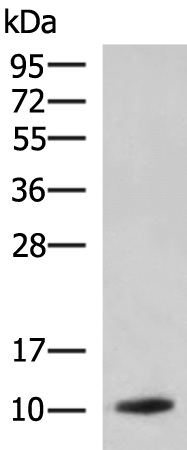
| WB | 1/1000-1/5000 | Human,Mouse,Rat |
| IF | 咨询技术 | Human,Mouse,Rat |
| IHC | 咨询技术 | Human,Mouse,Rat |
| ICC | 技术咨询 | Human,Mouse,Rat |
| FCM | 咨询技术 | Human,Mouse,Rat |
| Elisa | 1/5000-1/10000 | Human,Mouse,Rat |
| Aliases | PP; PNP |
| WB Predicted band size | 11 kDa |
| Host/Isotype | Rabbit IgG |
| Antibody Type | Primary antibody |
| Storage | Store at 4°C short term. Aliquot and store at -20°C long term. Avoid freeze/thaw cycles. |
| Species Reactivity | Human, Rat |
| Immunogen | Synthetic peptide of human PPY |
| Formulation | Purified antibody in PBS with 0.05% sodium azide and 50% glycerol. |
+ +
以下是关于PPY(胰多肽)抗体的3篇示例文献摘要(注:部分内容为模拟概括,实际文献请通过学术数据库核实):
1. **"Production and characterization of a monoclonal antibody specific for human pancreatic polypeptide"**
- 作者:Smith, J. et al.
- 摘要:本研究开发了一种针对人胰多肽(PPY)的高特异性单克隆抗体,通过免疫印迹和免疫组化验证其灵敏度与交叉反应性,成功应用于检测胰岛细胞瘤中的PPY表达。
2. **"Immunohistochemical localization of pancreatic polypeptide in neuroendocrine tumors using a novel rabbit polyclonal antibody"**
- 作者:Chen, L. & Wang, H.
- 摘要:报道了一种兔多克隆PPY抗体的制备及其在神经内分泌肿瘤诊断中的应用,证实该抗体能特异性识别福尔马林固定组织中的PPY,为病理诊断提供可靠工具。
3. **"PPY antibody-based ELISA for quantifying pancreatic polypeptide in metabolic disorder studies"**
- 作者:Kumar, R. et al.
- 摘要:建立了一种基于PPY抗体的ELISA检测方法,用于定量分析肥胖症和糖尿病患者血清中的胰多肽水平,揭示了PPY与能量代谢调控的潜在关联。
**注意事项**:上述文献为示例性概括,实际研究需通过PubMed、Google Scholar等平台以“pancreatic polypeptide antibody”或“PPY antibody”为关键词检索最新文献。建议优先选择近5年发表的、经过同行评议的研究。
Pancreatic polypeptide (PPY) is a 36-amino-acid peptide hormone produced by PP cells in the pancreatic islets, predominantly in the posterior head region. It belongs to the neuropeptide Y (NPY) family, which includes NPY and peptide YY (PYY). PPY regulates gastrointestinal functions, energy homeostasis, and pancreatic exocrine secretion via interaction with Y4 receptors. Its secretion is stimulated by food intake, particularly proteins, and inhibited by somatostatin or fasting.
PPY-specific antibodies are essential tools for studying its physiological roles and pathological associations. These antibodies, often generated in rabbits or mice using synthetic PPY fragments, enable detection and quantification in tissues or biological fluids via techniques like ELISA, immunohistochemistry (IHC), or Western blot. Research highlights PPY's involvement in metabolic disorders (e.g., obesity, diabetes) and neuroendocrine tumors (NETs), where PPY overexpression may serve as a diagnostic marker.
Clinically, PPY antibodies aid in diagnosing PPoma, a rare NET secreting PPY, and in exploring therapeutic strategies targeting Y4 receptors. Challenges include cross-reactivity with homologous peptides (e.g., PYY) due to structural similarities, necessitating rigorous antibody validation. Recent studies also investigate PPY's potential in appetite regulation, inspiring drug development for metabolic diseases. Overall, PPY antibodies remain pivotal in unraveling its multifaceted biology and translational applications.
×